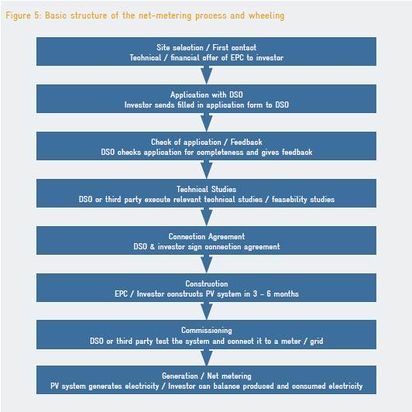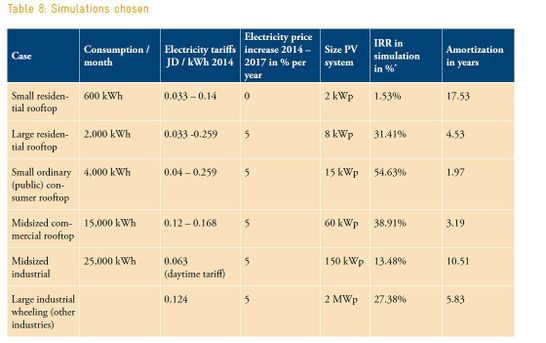Enabling PV in the MENA Region
The emerging PV market in Jordan
In Jordan the Renewable Energy and Efficiency Law 13 (REEL) of 2012 as well as bylaws enable Independent Power Producers (IPP) to provide electricity from renewable sources to NEPCO within long-term Power Purchase Agreements (PPA). Private investors may also invest in their own PV system up to 5 MWp to directly consume the electricity produced and offset it against their entire demand within a net-metering scheme. The REEL even allows the generation of electricity at a different site than where the actual consumer is located – so-called energy wheeling. As a result, there are two promising business cases that enable investments in PV: Direct Proposals for PPAs under consecutive rounds of "expressions of interest" and "net-metering". Apart from off-grid installations, around 3 to 4 MWp of solar PV systems under the net-metering scheme had been realized by April 2014, with another 4 to 5 MWp pending within the application process waiting list.
The analysis focuses in more detail on net-metering with PV, its sub-option of energy wheeling, as well as on Power Purchasing Agreements with the MEMR and its state-owned company NEPCO as contract partner. And although tender-based projects exist on government lands, they are not the focus of the study.
Legal and administrative processes for business models
The study describes in detail the legal and administrative processes for net-metering, wheeling as well as the direct proposal scheme. For each process step involved actors and delays are mentioned. In case that barriers have been identified proposals are made to clarify or speed up the process.
Simulation of PV business cases
The study simulates PV business cases for different types of PV installations (residential and commercial roof-top, midsize to large industrial) and provides an overview of the most attractive categories.
Dowload the study
Enabling PV in the MENA region - The emerging PV market in Jordan
The emerging PV market in Tunisia
XXX
The ENABLING PV approach
Electricity from photovoltaics (PV) is about to reach grid parity in many countries of the MENA region, as well as generation parity in some countries of the region. More and more governments are promoting large or small decentralized forms of PV projects, which are coupled with the conventional electricity grids. Within this context, the overall goal of the project "Enabling PV" is to contribute to the sustainable use of PV in the MENA region. As the first show case, the project focuses on the emerging solar markets of Tunisia and Jordan.
"Enabling PV" as a project is coordinated by Deutsche Gesellschaft für Internationale Zusammenarbeit (GIZ) within the framework of the regional project "Mediterranean Solar Plan (MSP) – Technology Cooperation". It has been financed in the framework of the International Climate Initiative (IKI) of the German Ministry for the Environment, Nature Conservation, Building and Nuclear Safety (BMUB). The German Solar Industry Association (BSW-Solar) and the consulting company eclareon GmbH are responsible for executing the "Enabling PV" in Tunisia and Jordan. The project also aims at supporting local renewable energy associations in MENA countries. "ENABLING PV" focuses on the following activities in Tunisia and Jordan:
- Identifying viable business models for solar PV in Jordan and Tunisia on the basis of real-life experiences of local and foreign project developers and investors.
- Analyzing the legal and administrative process flows for each identified business model and making the results available to local and international investors.
- Detecting existing barriers to the implementation of business models.
- Formulating concrete recommendations for removing these barriers and discussing them with decision-makers.
- Strengthening cooperation and transferring knowledge between relevant stakeholders, in particular from the private sector in Jordan, Tunisia and Germany.





















